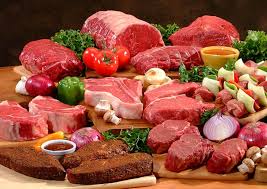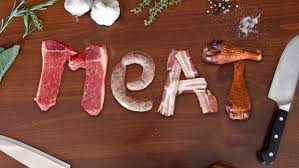If you are a food lover and enjoy your steaks and burgers, you must be interested in knowing more about pros and cons of meat. Meat is a great source of proteins, iron and many nutrients. The thing is excess of everything is bad. But if consumed in moderation, there are no serious health damaging effects associated with meat based foods. Let's find more about the pros and cons of eating meat.
Pros of Eating Meat

1. High Protein Content
Proteins are made up of amino acids. There are twenty types of amino acids, 9 of which are essential and the rest nonessential. All types of meats are complete proteins that contain all types of essential amino acids. Complete proteins are essential for cell growth, muscle gain, strong immune system and hormone production.
The recommended protein intake for adults is 0.8 grams per kg/day. For athletes and people who perform high intensity exercise or work outs, 1.5-2 grams per kg/day is best to prevent muscle damage.
2. Increased Functional Ability
Hemoglobin carries oxygen in the body through red blood cells while myoglobin stores oxygen in muscles. Adequate iron intake is essential to maintain the levels of hemoglobin and myoglobin. Lack of iron can cause anemia which can result in tiredness, fatigue and lack of energy. Meat, especially organ meat, is an excellent source of iron.
The recommended daily intake of iron is 8 milligram/day for men and 18 milligrams/day for women. Iron absorption is improved in the presence of vitamin C. Make sure to include a side dish of vitamin C rich vegetables like broccoli, tomatoes or red peppers with your meat based meals to get maximum benefit.
3. Stronger Immune System
Meat is an excellent source of zinc which is known for its antioxidant properties. A 3 ounce serving of bison meat contains 4.5 milligrams of zinc. The recommended daily intake for zinc is 8 mg per day for women and 11.5 mg per day for men. Zinc makes the immune system stronger and prevents many diseases. It is also required for hormone production and plays a vital role in reproductive health. A strong immune system is one of the biggest advantages of eating meat and must be included in the list when comparing pros and cons of eating meat.
4. Better Energy Levels
A balanced diet is essential to maintain energy level. The proteins, carbohydrates and fats are all broken down to fuel the body. This process of breaking these down is done by vitamin B and meat is a great source of vitamin B. The vitamin B group includes five vitamins, Thiamine, Niacin, B 12 and pentothenic acid and biotin, all of which are present in meat. These are necessary for red cell production and nerve function as well. You can have the meat dish paired with some whole wheat bread or fresh vegetables for maximum vitamin B availability.
Cons of Eating Meat
1. Damage to Blood Vessels
Red meat contains carnitine which is known to cause atherosclerosis. Atherosclerosis is clogging or hardening of blood vessels which can cause serious damage to vital organs like heart and brain. Increased consumption of carnitine puts you at a greater risk of developing heart disease. A recent scientific study concluded that carnitine is converted into a substance trimethylamine-N-oxide (TMAO) by the action of bacteria in intestines. This substance can damage the heart.
2. The Risk of Getting an Infection Like E. Coli
The list of pros and cons of eating meat is a long one. A serious danger associated with eating meat is the chance of infection by bacteria like E coli. E coli infection can cause diarrhea and severe dehydration. The risk can be minimized by thoroughly cooking the meat. Always make sure to keep the raw and cooked meat separate. Ground meat used to make burger patties can contain bacteria as the mince is made from the leftover cuts of different animals.
3. Increased Risk of Developing Type 2 Diabetes
Red meat and processed meat can increase the risk of developing type 2 diabetes. People who eat more than 3.5 ounce of red meat or more than 1.9 ounce of processed meat daily are at greater risk of developing diabetes. It can also lead to obesity and other health problems.
4. The Risk to Colon and Brain
Meat is a rich source of iron and excessive iron consumption can lead to iron deposition in various tissues. This excessive iron can destroy myelin, which is the protective sheath around nerve fibers. The damage to this protective layer can interfere with the nerve transmission and can lead to Alzheimer's disease.
People with a family history of colon cancer should eat meat in moderation. Excessive meat consumption can trigger their immune system and inflammatory response.
5. It Can Contain Harmful Hormones
Meat can contain some hormones or hormone like substances. These hormones can be dangerous and according to one resent study the risk of developing hormone sensitive breast cancer was noted to be two fold in women who consumed 1.5 servings of meat daily as compared to those who had three or less servings of meat per week. According to scientists the cancer causing effects are due to hormone like substances present in meat which can get attached to hormone receptors in tumor cells and can affect their growth.
Be a Healthy Meat Eater

The pros and cons of eating meat can balance each other out. Here are some tips about how you can be a healthy meat eater:
- Prefer Lean Meat: When choosing meat, go for the lean option. Pick up something with least amount of fat. The best and healthiest choice is white meat without skin. If you want to eat red meat, go for a "choice" or "select" cut rather than the cut labeled "prime" as it can contain extra fat.
- Be Wise When Selecting Ground Meat: Ground meat can contain excessive fat and it is better to be aware of how much fat it contains. It varies greatly and if you are not sure, ask the butcher or read the label carefully to exactly know how much fat it has.
- Go Easy on Salt: While preparing any meat dish, try to add minimum salt. You can add different herbs and spices to enhance the flavor. When selecting processed meat or picking up a sandwich, go for a low sodium option.
- Cook It Right: It is very important to cook the meat properly. There are hundreds of ways to cook meat. Make sure to cook it in minimum oil or butter.
- Remove as Much Fat as You Can: It is better to remove as much fat from the meat as possible. Trim the excessive fat from red meat and remove the skin from poultry.
